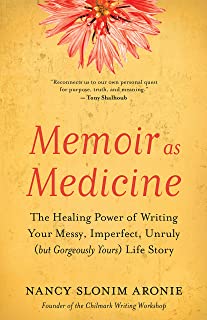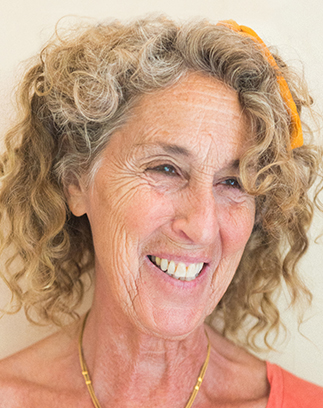Nancy Slonim Aronie is the founder of the Chilmark Writing Workshop on Martha’s Vineyard, Massachusetts where she lives. She’s been facilitating Writing from the Heart workshops for forty-five years at various venues such as Kripalu, Omega and Esalen. In her new book, Memoir as Medicine: The Healing Power of Writing Your Messy, Imperfect, Unruly (but Gorgeously Yours) Life Story, she shares her good advice about writing, essays she has written for various publications, and excerpts from a previously unpublished memoir about her son Dan.
 In an interview with her publisher, New World Library, Nancy said: “Getting your rage on the page and getting to the truth of what shaped you instead of having those stories marinating in your body, that’s the medicine.” As for the benefits of telling your story, Nancy said: “Telling your story and getting it out of your body is the beginning of healing. You will get a new perspective, maybe new insights, a new way of seeing the whole picture instead of just that tiny thing that happened or even a big thing that happened.”
In an interview with her publisher, New World Library, Nancy said: “Getting your rage on the page and getting to the truth of what shaped you instead of having those stories marinating in your body, that’s the medicine.” As for the benefits of telling your story, Nancy said: “Telling your story and getting it out of your body is the beginning of healing. You will get a new perspective, maybe new insights, a new way of seeing the whole picture instead of just that tiny thing that happened or even a big thing that happened.”
When asked about a spiritual component to memoir, Nancy said: “Spiritually, if you are willing to take the lessons from the information you’re accessing, because all you want to do is grow and be a more loving being on the planet, then of course there is a spiritual element.”
I appreciate what Nancy says about writing groups for writers: “Everyone needs a support system.” She recommends, as I do, that people don’t “criticize and destroy your voice.” Nancy said: “They can give you good advice, but to me, the most important part of that equation is that they find beauty in your work first.”
Where to start? Nancy said in her interview: “There are lots of beginnings. Chronology isn’t majorly important. Authenticity is. Storytelling is. Sounding like you, is. Connecting the dots, not only what happened but how it affected you, how it changed you, how it shaped you. Those are important. Not necessarily starting from when I was born and this happened and that happened and this happened.”
In an early chapter in the book, “You Don’t Have to Start at the Beginning of Your Life,” Nancy includes a few of her rejected beginnings and then the one she chose for a piece called “Rent-a-Mouth” previously published in Vineyard Gazette.
Nancy points out right at the beginning of Memoir as Medicine, that her one rule in her workshops is that when someone finishes reading, “tell her what you loved.”
This the approach, as referred to in her interview, I so appreciate. “When you are willing to take the chance of saying this is who I am, these are the things that shaped me, this is where I am now, magic happens, health happens, healing happens.”
“Say yes,” Nancy urges regarding the telling of your ongoing story. “Don’t worry about the ancestors. They’re dead. Don’t worry about the young ones. They can’t read yet. Don’t worry about your readers. You tell your truth, and they will turn the page.”
As poet Sean Thomas Dougherty says in answer to “Why bother?”: “Because right now there is someone out there with a wound in the exact shape of your words.”
As for the excerpts from her previously unpublished memoir about her son Dan, Nancy says: “Writing about my experiences with this sick kid gave me exactly what I needed to see what I was doing. It didn’t happen overnight. It was a long trip from brutal awareness to actual change.”
Dan was diagnosed with diabetes at nine months old and at twenty-two, with multiple sclerosis. For sixteen years, Nancy and her husband took care of Dan until he died at age thirty-eight. What she realized in writing her memoir about him was that by trying to make life “easier” for him, “by reinforcing the message that he was handicapped in every way, I was actually crippling him more than the disease was.”
Each of the chapters ends with a writing prompt such as “Write your book jacket.” This is a good way to figure out what the book you say you are writing is actually about. In Nancy’s example, about her proposed book, says: “The things she tells participants in her renowned writing workshops, ‘Write the sorrow out of your body or the sorrow will find its way into you’ and ‘You cannot skip the pain part,’ become the very things Aronie needs to learn for herself.” [Photo of Nancy Slonim Aronie by Eli Dag.]
 Besides being so honest in her memoir, Nancy shares her good humour. In the sample book jacket, she says of herself: “A control freak by nature. . . “
Besides being so honest in her memoir, Nancy shares her good humour. In the sample book jacket, she says of herself: “A control freak by nature. . . “
Later, when describing meeting her husband Joel in 1965, Nancy tells how her grandmother also fell in love with him. Gram would get Joel to fix the disposal in her sink and afterwards, in her Yiddish accent, say: “I hef two voids for dat boy: vunduh ful.”
As well as the humour, Nancy shares poignant pieces written about the days leading up to her sister’s death for instance. “Sisters” was previously published in Martha’s Vineyard Times and of the essay she says: “It was only by writing it that I was able to get in touch with what I really felt.”
“Don’t Shy Away from Taboo Topics” is one of the chapter titles and in this one, Nancy includes a piece about her son Dan’s constipation and how she helps out. In an earlier chapter, she receives a phone call from Dan about his impotence. Yes, Nancy took on the challenge of taboo topics.
Memoir as Medicine has chapters on Solitude, Grief, giving a story time to breathe, being an eavesdropper, using dialogue and “Read, Read, Read.”
As for Nancy’s stories about publishing her work, there are those too. I especially like the one about her experience working as an editor for Lear’s magazine and being fired by Frances Lear. She didn’t think she could write about the experience right away but an editor, Lary Bloom at Northeast Magazine, told her to write immediately. She later “realized how powerful it is to write when you’re in the middle of a tragedy.”
The piece was published in Northeast Magazine and is included in the chapter entitled “Write the Blood on the Page.” “Queen Lear” is a beautiful essay, full of dialogue, enthusiasm and Nancy’s good humour. She used what she calls the “Day 1, Day 2 . . . method” which got her started.
A good idea suggested by Nancy is serializing your memoir in a blog. In that particular chapter, Nancy says: “Write three titles for your blog.” There are real benefits to blogging as it keeps you writing, without outside pressure, and you have readers some of whom may even give you some positive comments to keep you going. You develop a writing community this way, maybe a following, and it could be “you might even catch the attention of a publisher so that the blog can turn into the book.”
Another good idea I’m realizing is that previously published pieces could be part of your memoir as Nancy has done. You could even include letters to the editor – if they tie into the theme of your memoir.
If you think you can “Just take all my journal entries and turn them in to a book,” Nancy says: “Good try, lazy bones.” With a journal, you’re usually writing about what happened. In a narrative, “you’re writing about what you learned from what happened.”
In a chapter near the end of Memoir as Medicine, Nancy advises choosing the best stories and omitting the ones that illustrate the same point. “We don’t need to hear how much you suffered. We need to know how much you survived.”
Nancy includes a poignant essay about her son Dan’s final days. Her final chapter, “Endings,” gives the advice she has followed herself: “You are not copying your journal entries. You are telling your story, showing your struggle, sharing your little victories and how you emerged out of the hole, only to be knocked back again, letting us climb out again and again with you. And ultimately giving us a map showing how you managed.”
There are many more examples to share with you but I think I’ll just suggest you buy the book and be inspired to find the medicine in the writing of your own stories.
